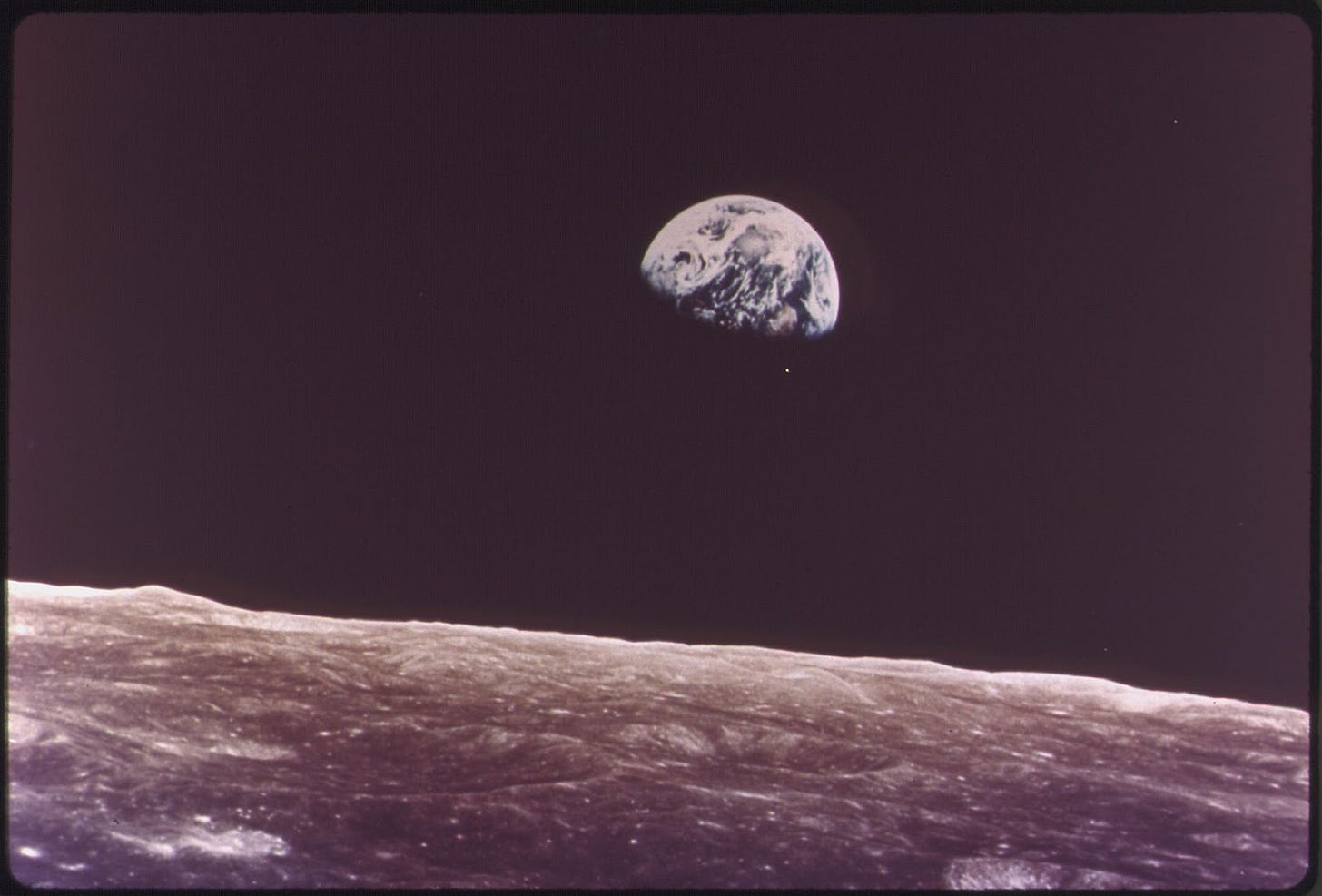What we can learn from an image taken 53 years ago
Plus, how to cope when pandemic fatigue returns
“We're so concerned about how these children are going to turn out that we're unwilling to give them the autonomy that they need to be able to take risks and go out and explore the world.” —Alison Gopnik
BRAIN WAVES
Our pale blue dot. In December 1968, astronauts William Anders, Frank Borman and James Lovell were on a mission to orbit the moon. The astronauts of Apollo 8 became the first people to see Earth from the moon’s orbit, and on December 24, they photographed the above image, which came to be known as Earthrise. “Often credited with kicking off the environmental movement, the ‘Earthrise’ image underscores our responsibility to preserve and revere our planet,” writes Olivia Hains at Psyche. “It grounds us by showing that Earth is only a piece of a whole – that there is more to life than life itself.” Psychologist Jay Van Bavel, who studies group identity, told us that astronauts are forever changed by the experience of seeing Earth from afar. They become hyper aware of their connection to humanity. Anders has said of the image: “I was immediately almost overcome by the thought that, here we came all this way to the moon and yet the most significant thing we're seeing is our own home planet, the Earth.” Most of us will never get to experience the awe of seeing our home from this perspective, but the Earthrise image, which turns 53 this week, serves as a reminder that we are all connected in this way. As astronomer Carl Sagan has said, “It underscores our responsibility to deal more kindly with one another, and to preserve and cherish the pale blue dot, the only home we've ever known.”
Pandemic fatigue. The recent increase in shutdowns, closures, and cancellations has many of us feeling pandemic fatigue all over again. “If you're already... emotionally, mentally and physically exhausted from this pandemic, this variant is a catalyst for being more tired and more physically exhausted,” health policy expert Ahmad Firas Khalid told CTV news. “The Omicron variant is like putting gas onto an already flammable situation.” As we brace for whatever Omicron may bring, experts seem to agree: It’s more important than ever to focus on self-care. But finding a way to give back might also be a useful way to cope, says neuropsychologist Barbara Sahakian. “Volunteering gives people a sense of meaning in life, and it promotes happiness, health and well-being,” Sahakian said. “In older adults, it's been found to be associated with greater life satisfaction and reduced depression and anxiety.” Now may be the perfect time to start a (COVID-friendly) volunteer tradition. But if nothing else, let this be a gentle reminder to practice a little self-compassion as the year winds down.
We all think we know what will make us happy: more money. A better job. Love. But psychologist Sonja Lyubomirsky says happiness doesn’t necessarily work like that. This week, we explore why happiness often slips through our fingers, and how to savor — and stretch out — our joys. Listen to learn more.
ON THE HIDDEN BRAIN PODCAST
Dec 20: When we think about raising a human, it's natural that most of us think about the role that adults play in shaping their children. But when should we step back and just let our children be?
Dec 27: At the beginning of the year, many of us make resolutions for the months to come. We resolve to work out more, procrastinate less, or save more money. Though some people stick with these aspirations, many of us fall short. This week, psychologist Wendy Wood shares what researchers have found about how to build good habits — and break bad ones.
ON THE MY UNSUNG HERO PODCAST
Dec 23: Eight years ago, Sophia Croll was stressed out at the airport. She found an empty bench and sat down alone to cry. A stranger approached her with some words of comfort that Sophia will never forget.
MIND GAMES
What is special about the following words: revive, banana, grammar, voodoo, assess, potato, dresser, uneven?
LAST WEEK’S PUZZLE
What lives in winter, dies in summer, and grows with its roots upward?
The answer: An icicle
FROM THE TWITTERATI…
A MOMENT OF JOY
…and to all a good night.
Have an idea for Hidden Brain? A story you want to share with us? Send an email to ideas@hiddenbrain.org. And if you’d like to support our work, you can do so here. Listen to us on Spotify, Apple or your favorite podcast platform.






